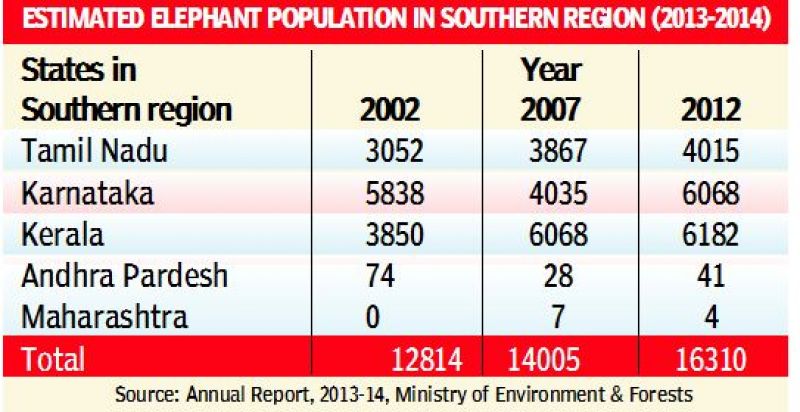Man-animal conflict relief goes heavy on govt coffers
India alone accounts for about 25,000 elephants with more than 50 per cent residing in western ghats.

Chennai: Tamil Nadu is one among the leading states implementing Project Elephant, pursuing scientific management and habitat conservation for the past two decades spending more than Rs 2 crore on its elephant habitats.
Interestingly, Tamil Nadu has registered an increase of 2,501 square kilometre of forest cover. For the past seven years TN is a home to around 4,000 to 4,200 elephants and now with the south India recording an unprecedented drought the jumbo population is likely to be down by 5 to 10 per cent, informed wildlife sources with the TN forest department said.
These elephant reserves in the state have no separate legal status. And for the year 2016-17, the government enhanced the rate of compensation amount to be paid for damages caused to properties and human death by wildlife, particularly elephants. The compensation for human death and permanent incapacitation has been raised from Rs 3 lakh to Rs 4.lakh and for major injuries from Rs 0.30 lakh to Rs 0.59 lakh.
“A sum of '4.27 crore was spent for 2,921 beneficiaries last year and elephants account for the maximum human- animal conflicts in the state. For the current fiscal 2017-18, this scheme will continue with an outlay of Rs 5.30 crore. The compensation expenses have been rising steadily due to the degradation of forests in TN”, admitted another forest official.
“The goal of the World Elephant Day is to create awareness of the urgent plight of African and Asian elephants and to share knowledge and positive solutions for the better care and management of captive and wild elephants. African elephants are listed as vulnerable and Asian elephants as “Endangered” on the IUCN Red List and this is a threat to elephant population in India”, explains wildlife biologist Dr A. Kumaraguru of Sathyamangalam Tiger Conservation Foundation.
India alone accounts for about 25,000 elephants with more than 50 per cent residing in western ghats.


